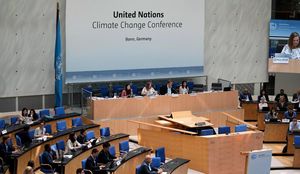Recent developments have shone a light on the complex dynamics between Russia, Ukraine, and their respective allies, underlining the precarious situation as the war rages on. Newly uncovered documents have revealed Russia’s first proposal for peace—an agreement more akin to Ukraine’s capitulation than any genuine effort at reconciliation.
According to Radio Free Europe, the documents from March 7, 2022, just 11 days following Russia's invasion, outlined what they termed the “Agreement on settlement of the situation in Ukraine and neutrality of Ukraine.” Interestingly, this so-called neutrality would have effectively turned Ukraine, once part of the Soviet Union, back under Kremlin control, functioning as what some analysts have described as a puppet state.
The proposal was quite demanding, with key points advocating for Ukraine to surrender Crimea—annexed by Russia nearly a decade ago—and the Donbas region, where fierce conflict has persisted since 2014 due to the presence of pro-Russian separatists. Surprisingly, Russia sought to have Ukraine not only relinquish eastern territories but also pledge never to join NATO. Further, it suggested drastically reducing Ukraine's military from around 250,000 personnel to merely 50,000. This disarmament would have limited Ukraine to retaining only four ships, 55 helicopters, and 300 tanks.
Such demands were met with deep suspicion and outright refusal from Kyiv, illustrating the significantly different stakes for both nations. Ukrainian President Volodymyr Zelenskyy has continued to warn about the dangers stemming from North Korea's apparent alliance with Russia, cautioning about the broader instability it could introduce to the Asian geopolitical theatre.
Meanwhile, as tensions brew on one front, reports have emerged of another concerning plot. Western intelligence has suggested Russia might be plotting to plant explosives on passenger flights destined for the United States and Canada. This assertion follows two separate explosions at DHL hubs this past July, which investigators believe are linked to Russian sabotage efforts.
According to The Wall Street Journal, officials stated these incendiary devices were shipped disguised as electric massagers from Lithuania to the United Kingdom. The explosions at the logistics centers sparked international concern and have prompted investigatory scrutiny across Europe. It appears those responsible intended for these devices to serve as test runs for future plots potentially targeting North American aircraft.
Poland has since reported arrests linked to this incident, with four individuals detained under accusations of engaging in sabotage or terrorist operations for foreign intelligence agencies. The Prosecutor’s Office indicated these operatives were attempting to assess how they might effectively deliver explosives across international borders.
Pawel Szota, the head of Poland’s foreign intelligence, emphasized the gravity of the situation, indicating any successful attack orchestrated under the guise of these packages would represent a significant escalation of Russia’s aggressive posture toward Western powers.
Authorities have repeatedly stressed the volatility of the current geopolitical environment, and the ramifications of even minor disturbances could be catastrophic. With Russia’s apparent detachment, exemplified by these alleged sabotage efforts and intense military demands on Ukraine, the international community watches closely, awaiting the next move.
Overall, the situation remains highly fragile, defined by Moscow's bravado and Ukraine's staunch resistance, bolstered by Western support. The entanglement of these recent incidents serves to highlight not only the stakes of the current war but also the lengths to which Russia may go to assert its influence and destabilize the West.



